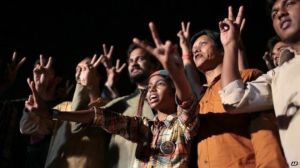A view from the border: Everyday lives in Burma’s conflict zones in times of transition
LSE Arts public exhibition
Dates: Monday 13 April – Friday 8 May 2015
Time: 10am-8pm, Mon-Fri
Venue: Atrium Gallery, Old Building
The photo exhibition portrays the everyday lives of people in Burma’s conflict-ridden Kachin State. Its particular focus rests on areas under control of ethnic rebel groups. While most international media attention is drawn to the sea changes in central Burma, these places of ongoing conflict are often ignored. This is not least due to difficulties of access to an area that is off-limits for international journalists and aid organisations. The exhibition, hence, offers rare insights into the present-day struggle of Burma’s ethnic minorities, including displaced communities and insurgents. It also sheds light on rampant extractive border economies, which fuel protracted armed conflict and infringe on local livelihoods. By doing so it asks whether and how the country’s wider transition affects the everyday reality in the country’s borderlands.
The photographs were taken by two local photojournalists and a doctoral candidate from the LSE. Hkun Li and Hkun Lat are two brothers from Kachin State. They use photography to portray the re-escalation of civil war that has unsettled their youth. David Brenner uses photography to communicate his research on the conflict.
This exhibition is generously supported by the International Relations Department at the LSE.
This exhibition is open to all, no ticket required. Visitors are welcome during weekdays (Monday – Friday) between 10am and 8pm (excluding bank holidays and when the school is closed for Christmas and Easter ).
Please click here for more information
Call for Papers: Patterns of Integration of Old and New Minorities in a Europe of Complex Diversity
October 7-9, 2015, Cluj-Napoca (Kolozsvár, Klausenburg), Romania
While numerous autochthonous ethnic, national and regional groups formulate claims on power-sharing and minority rights, pushing their host states to accommodate diversity, increased mobility has contributed to the further proliferation of cultural, linguistic, and religious diversity in the European Union and its south-eastern vicinity. Commentators label this as “complex” diversity, as many classically more homogenous societies become more and more multicultural, and various forms of transnational citizenship become a widespread phenomenon.
This increasingly complex diversity of the European societies, together with the global spread of supranational norms and values of human rights is continuously undermining the Westphalian system of homogeneous nation states. The question arises how these challenges can be reconciled, what best practices can be identified for both “old” and “new” minorities, and whether the arrangements for the former can be a model for the latter, mobile minorities. In sum, the central question this conference aims to address is how social cohesion can be achieved in diverse societies.
The organizers welcome theoretical analyses and empirical case studies on the causes, consequences and possibilities of accommodation of complex diversity against the backdrop of the multi-layered system of governance within the European Union. The contributions should outline in what way political and societal cultures, institutional arrangements or public policies contribute to or hinder the accommodation of complex diversity.
The deadline for applying to the conference is July 1, 2015. Please complete your abstract (250-300 words), together with a brief bio, including your academic/institutional affiliation on the following link. Panel proposals including a chair, 4-5 speakers and a discussant are also welcome. The selection of participants will be carried out no later than July 20, 2015.
The conference will be held in Cluj-Napoca, at Sapientia University.
Further questions should be submitted to the e-mail address minorityconference@gmail.com



